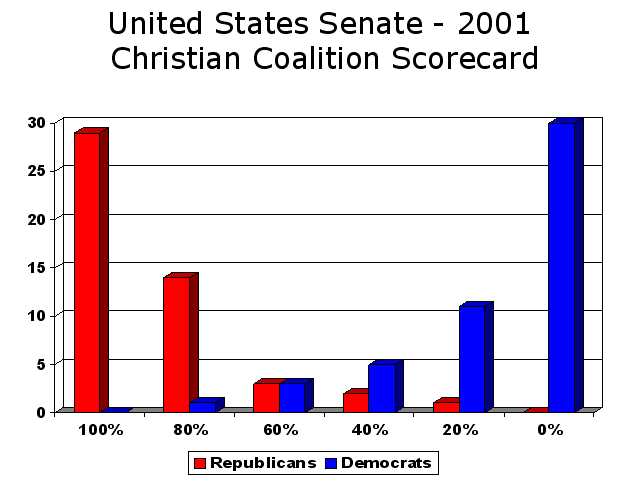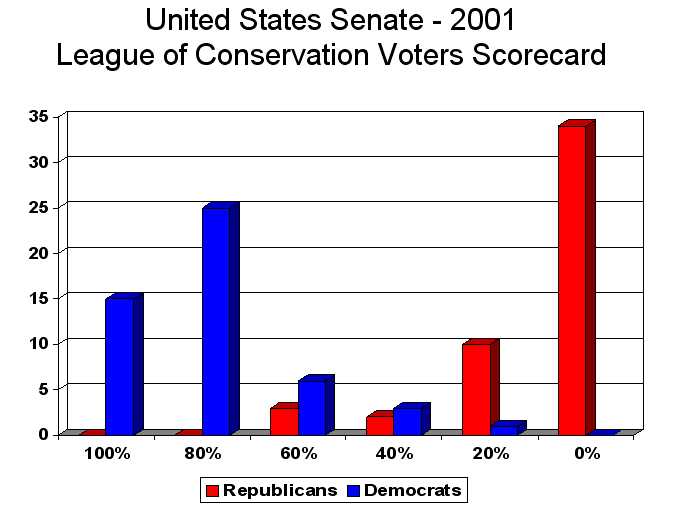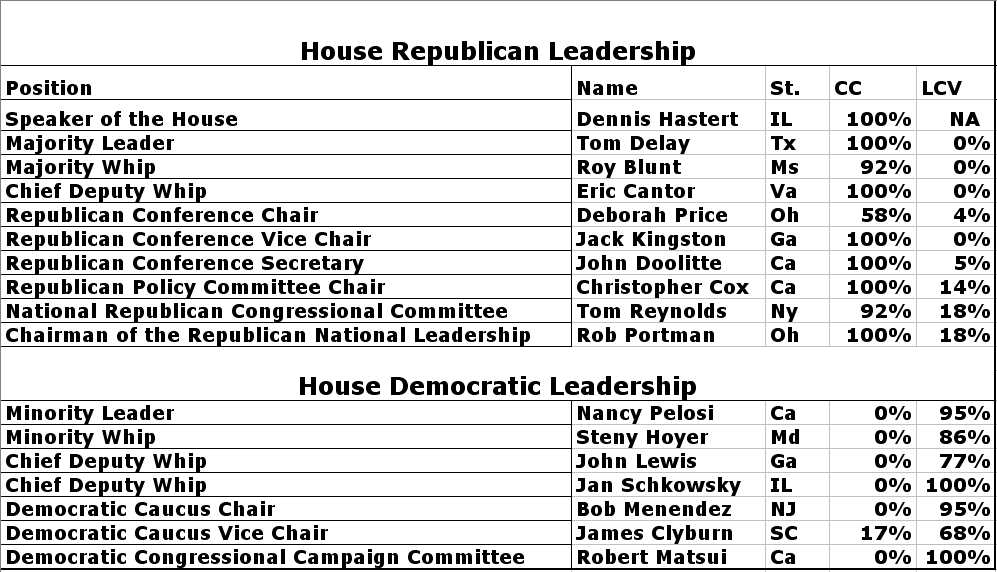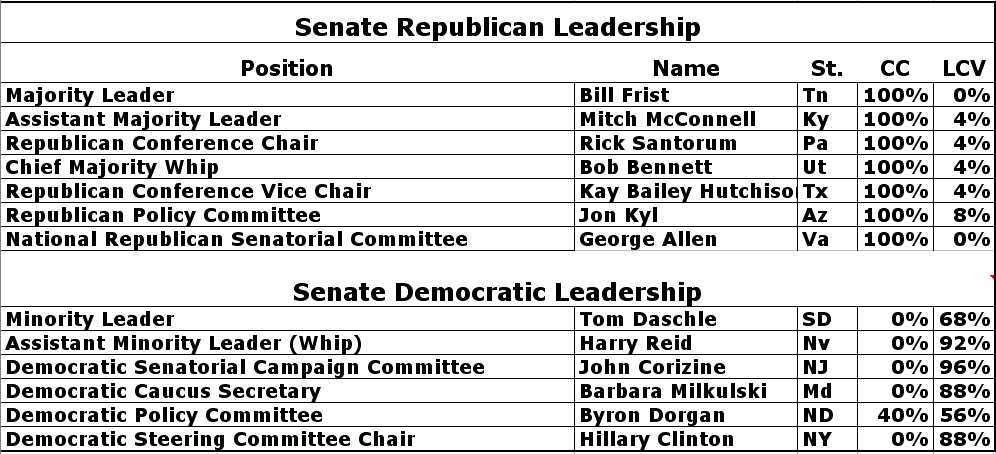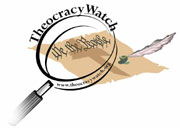
The Rise of the Religious Right
in the Republican Party
|
|||||||
|
|||||||
|
perpetrated on the American people." In this section: Related Topics: Texas Republican Party Platform, Religious Right Economics Core ValuesThe Bush administration is waging a virtual war on the environment enabling industries to decimate forests, divert water, pollute national parks, and release CO2 and toxins into the atmosphere.This disregard for the environment reflects core values of the theocratic right, a movement strongly allied with big corporations. The theocratic right should not be confused with Evangelicals, a group that covers the entire political spectrum. The Texas Republican Party Platform, a document that reflects the goals of the theocratic right, opposes efforts to regulate industry by affirming a belief in "a strong and vibrant private sector unencumbered by excessive government regulation." It calls for abolishing the Environmental Protection Agency, and reaffirms "the belief in the fundamental right of an individual to use property without governmental interference." It also opposes conservation easements administered by nonprofits. On April 17, 2005, the New York Times published an article about the Constitution in Exile movement. Their judicial philosophy extols the absolute rights of property owners which is also reflected in the Texas GOP Platform. America's Providential History, a best-selling textbook that is popular in Christian schools and the Christian homeschool movment teaches history from a "Biblical worldview." It explains that property rights are God-given:
From God Hates Environmentalists, Bill Berkowitz, June, 2001:
This editorial from the New York Times -- Destroying the National Parks, (August 29, 2005) illustrates the impact of the theocratic right on our national parks.
To see Senate scorecards produced by the League of Conservation Voters, a consortium of environmental organizations, compared to the scorecards produced by three organizations that promote the theocratic right -- the Christian Coalition, the Family Research Council, and the Eagle Forum -- click here. (These tables were provided by Glenn Scherer, October, 2004.) James Dobson of Focus on the Family represents the ideals of the theocratic right:
Deregulation of industry lies at the heart of the Religious Right agenda. The Washington Post has published a three-part series detailing how the Bush administration is systematically dismantling the regulatory functions of government in ways that are not obvious and receive little public debate. The lifting of regulations by the Bush administration is devasting to the environment and public health. The first article from the Post is called Bush Forces a Shift In Regulatory Thrust, OSHA Made More Business-Friendly, August 15, 2004. The second article, August 16, 'Data Quality' Law Is Nemesis Of Regulation talks about the health threat of a law to deregulate chemicals. The third article, August 17, Appalachia Is Paying Price for White House Rule Change explains how Bush administration rule changes are devastating the environment. A study reported on CNN News, The Unborn babies carry pollutants, provides striking example of why regulations are important. Click here. Bush Nominates Anti-Regulatory Zealot to Head "Super-Powerful" Public Safety Office ThinkProgress.org, July 6, 2006 The American Legislative Exchange Council represents a marriage of the Religious Right and big corporations. Founded in 1973 by conservative activist Paul Weyrich and a handful of state legislators, ALEC initially positioned itself as a counterweight to liberal foundations and think tanks, focusing on social issues like abortion and the Equal Rights Amendment.
On March 1, the Public Trust, a coalition of public interest organizations reported that the "Animal and Ecological Terrorism Act" is among the bills promoted by ALEC,
An impending sense of "end times" is good news for that portion of the Religious Right that sees destruction of the earth as fulfillment of Biblical Prophecy. Those who don't seek "end times," blame resource depletion on environmentalists who view natural resources as limited. Secular society "lack(s) faith in God's providence and consequently, men will find fewer resources... The Christian knows that the potential in God is unlimited and that there is no shortage of resources in God's earth." (America's Providential History.) The Earth is the Lord's, and the fulness thereof - Psalm 24:1 The term "Religious Right" is not synomous with "Evangelical." In contrast to the Religious Right, the Evangelical Environmental Network assumes responsiblity for protecting and restoring the environment stating: "Because we worship and honor the Creator, we seek to cherish and care for the creation." And the Religious Right is not a monolithic bloc. While legislators pushing the religious right agenda receive remarkably low scorecards from the League of Conservation Voters, James Dobson of Focus on the Family who is one of the most powerful figures of the Religious Right, actually signed an "Evangelical Call to Civic Responsibility" that, for the first time, emphasized every Christian's duty to care for the planet and the role of government in safeguarding a sustainable environment. Froim The Greening of Evangelicals, Washington Post, February 6, 2005: Another article from the Washington Post on the same day discusses a letter from people of faith to the Bush administration: 'God's Mandate': Putting The White House on Notice, Washington Post, February 6, 2005 The Religious Right's War On NatureFrom Robert Kennedy Jr. in Rolling Stones magazine, (12/3/03):
Air, Water, Land, Energy and the Global Climate: Bush's Stamp
It's no secret that the Bush White House and Republican National Committee serve the interests of polluting industries in exchange for big campaign contributions. But there's more to the story.
House Panel Receives Detailed Spending Plan for '06, Washington Post, May 6, 2005:
The Bush administration announced on December 23, 2003, that the Tongass National Forest in Alaska, the largest in the country, would be exempted from a Clinton-era rule, potentially opening up more than half of the 17 million-acre forest for more development and as many as 50 logging projects. On January 24, 2004, Interior Secretary Gale A. Norton cleared a plan to open 8.8 million acres of Alaska's North Slope to oil and gas development. The plan will be used to manage a northwest part of the government's 23.5 million-acre National Petroleum Reserve in Alaska, which geologists believe may contain 6 billion to 13 billion barrels of oil. The plan threatens the health of Arctic tundra, ponds and lakes that are home to wildlife and migratory birds, and will probably produce enough oil for six months only. Two riders attached to the Senate Omnibus bill, December, 2003, would weaken air pollution rules and weaken protections for dwindling fish species. Nature at Bay, New York Times, May 9, 2005 - an update on the war on nature. Healthy Forest InitiativeJudge Rules Logging Plan Illegal, The Oregonian, August 3, 2005 Trouble in the Forests, New York Times, January 1, 2005New York Times, July 13, 2004:
On March 23, 2004, the Bush administration eliminated a requirement for federal agencies to survey for rare species in Pacific Northwest forests and establish buffers to protect them, a change that will open up thousands of acres of old-growth forest to industrial logging. Defenders of Wildlife call Bush's Healthy Forest Initiative a plan that New York Times Editorial, February 12, 2003, discusses a Senate-House appropriations bill loaded with destructive anti-environmental riders: "[In] the so-called forest stewardship program, ... timber companies are allowed to harvest trees as payment in kind for other projects like road clearing or the thinning of underbrush to prevent forest fires. Conservationists fear that open-ended, broadly drawn stewardship contracts will give the loggers license to cut huge tracts that would otherwise be spared." U.S. to Open Remote Forests To Logging, Washington Post, May 6, 2005 Bush overturns logging, road ban in forests, USA Today, May 6, 2005 Roadless Rules, Washington Post, May 9, 2005 Clear SkiesThe New York Times, April 4, 2004:
The New York Times, August 28, 2003, calls Bush's clear air initiative, a
"Bush Administration to Gut Clean Air Act. Rule Would Allow More Pollution at 17,000 Facilities," claims the Natural Resources Defense Council. From the U.S. General Accounting Office: The Bush administration has undermined enforcement of the Clean Air Act. The public will be breathing dirtier air—and many of us dying sooner—as a result. The following press release from the Natural Resources Defenses Council criticizes the Bush administration for joining with Detroit to fight California's zero emissions vehicle. The "federal government's siding with Detroit is an unprecedented attack on California's legal right to regulate air pollution." U.S. Court Backs Bush's Changes on Clean Air Act, New York Times, June 25, 2005 Good news "A bipartisan group of Northeastern governors is expected to announce an historic agreement this week to reduce carbon dioxide emissions from power plants, a plan that would break sharply with Bush administration policy on global warming." A federal appeals court blocked some of the Bush administration's planned revisions to the Clean Air Act just three days before the EPA plan was to take effect. A three-judge panel agreed with 12 states and several major cities that the changes could cause irreparable harm to the environment and public health. The revisions center on repairs made to pollution-causing facilities. Undermining Environmental Law
Cornerstone environmental law, NEPA, under fire in energy bill, Grist, May 5, 2005 An Endangered Act, New York Times, July 5, 2005 National Environmental Policy Act Is 'At a Crossroads', Los Angeles Times, July 7, 2005 Coal Mines - Putting the Fox in Charge of the Hen HouseNew York Times, August 9, 2004 reports that a top executive in a Utah mining company now heads a mine safety agency. The result will be that dust levels in mines will rise substantially:
Undermining The Montreal Protocol to Protect the Ozone LayerOn February 7, the Bush administration sought an exemption to a ban on methyl bromide, a chemical that harms the ozone layer. He is now instituting that ban, threatening to unravel the Montreal Protocal to protect the ozone layer, the most successful treaty in the history of the environmental movement. Environmental writer, Glen Scherer, has writter an article in Salon on this important decision. Ultimately, the exemption was not approved by an international agency on the ozone layer. The New York Times reported on March 4, 2004, "U.S. Requests Exemption to Ozone Pact For Chemical," that the Bush administration filed a new exemption request with Montreal Protocol administrators requesting an additional 1.1 million pounds to the 2005 exemptions. The Washington Post, October 12, 2004: "... the Agriculture Department will allow the use of methyl bromide, a fumigant that harms the ozone layer, to treat wooden shipping pallets..." The New York Times, November 27, 2004:
Wetlands Protection Fades By and then, Politics or Change of Heart?The New York Times, February 11, 2003, claims that for the past two years the Army Corps of Engineers has been undergoing a "broad retreat" in the amount of wetlands it protects. The President reversed a proposal that would have opened millions of acres to commercial development and the pollution that goes with it. "The decision to reverse course is directly traceable to Mr. Bush's calculation that the proposal was politically unsustainable." "Here's why the environmental community isn't ecstatic over President Bush's call to spend more than $1 billion over five years to develop a hydrogen-powered car to wean us from our addiction to Middle East oil." Robert Kennedy Jr. discusses problems with Bush's proposal for fuel cell cars in this New York Times Op-ed, February 16, 2003. The White House is proposing that the military be exempt from environmental regulations, reported in New York Times, February 6, 2003. Repealing the Clean Water Act
Defunding the Land and Water Conservation FundThe Land and Water Conservation Fund is the main federal land-acquisition program. From the New York Times, June 16, 2004:
Snowmobiles, New York Times, August 20, 2004: "U.S. Would Allow 720 Snowmobiles Daily at Yellowstone"
Allowing Dumping of Raw Sewage - EPA May Allow the Discharge of Partially Treated Sewage. Guidelines That Are Near Release Would Permit Blended Waste, Washington Post, December 8, 2004 Definitely Don't Drink The Water, TomPaine, May 18, 2005 EPA Does About-Face, Won't Allow Partial Treatment at Sewage Plants in Storms, Environmental News Network, January 20, 2005 EnergyThe Bush Administration's 2005 budget "projects" $2.4 billion in federal royalties for oil and gas leases in the Arctic National Wildlife Refuge in 2006, even though the Senate has blocked drilling in the Arctic National Wildlife Refuge for two years in a row. "This is a huge giveaway for the oil and gas industry," said Rep. Edward J. Markey (D-Mass.) Negotiators Agree on Tax Breaks in Energy Bill, Washington Post, July 27, 2005
No Climate Change in Energy Bill - Domenici, Reuters, June 21, 2005 Change to the Clean Air Act Is Built Into New Energy Bill, New York Times, April 16, 2005 From the Daily Mislead, April 28, 2004. "BUSH DIVERTING ENVIRO FUNDS INTO FOSSIL FUELS"
Wilderness Site May See Oil Drilling, Los Angeles Times, May 31, 2005:
Anti-Environment Judicial NominationFebruary 6, 2004: The Senate Judiciary Committee took up the nomination of a longtime lobbyist for ranching and mining interests who has been a leading critic of environmentalists. Christian Coalition Scorecards compared to Environmental ScorecardsThe League of Conservation Voters (LCV) publishes a National Environmental Scorecard. The Scorecard provides objective, factual information about the environmental voting records of U.S. Representatives and Senators. more The higher the rating from Religious Right groups, the lower the rating from the League of Conservation Voters.The following graphs compare how Christian Coalition and the League of Conservation Voters(LCV) rated Congress in 2001. Republicans are red, Democrats blue. LCV is made up of several environmental groups.
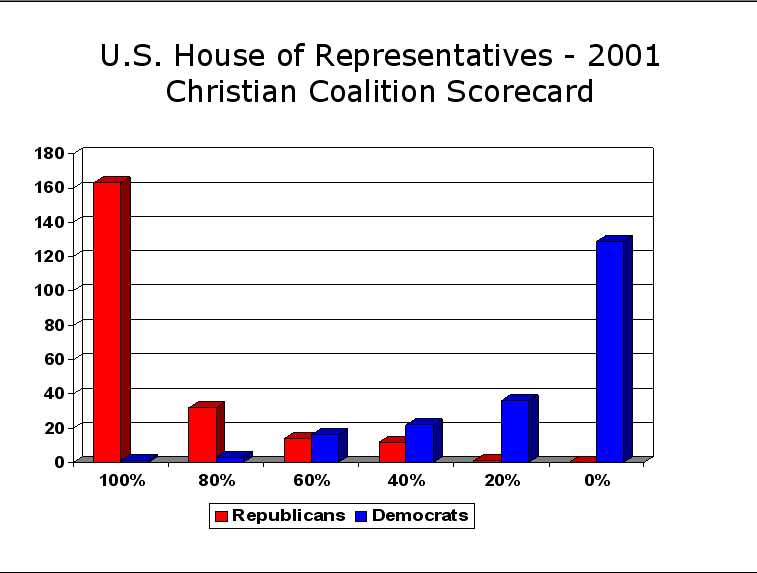 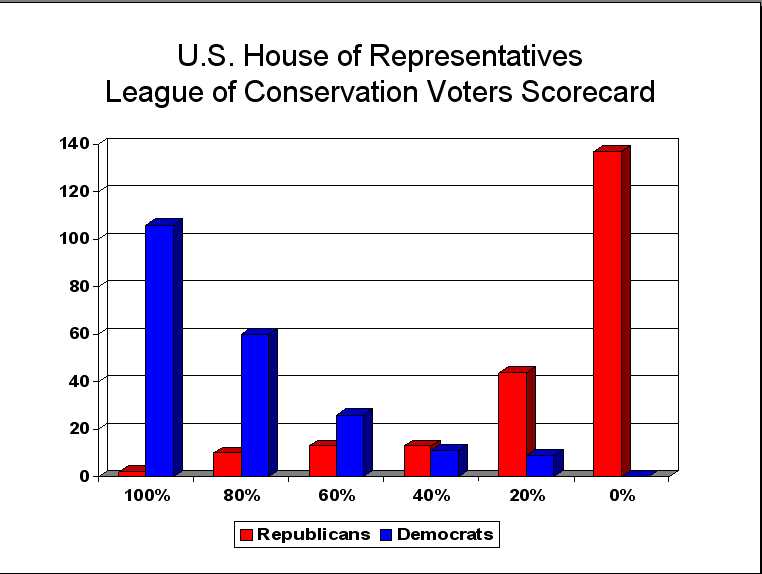
The first graph measures the Christian Coalition's scorecards for the United States Senate in 2001. Republicans, mostly in the 100% column, scored very high. Most Democrats received 0. The second graph -- which is the opposite -- shows how the League of Conservation Voters rated the U.S. Senate that year. 15 Democrats voted in favor of environmental issues 100% of the time. 34 Republicans voted in favor of environmental issues 0% of the time. If you add the 25 Democrats who received 80% with the 15 who received 100% the number is 40. 40 out of 50 Democrats in 2001 had strong environmental voting records. If you add the 10 Republicans who received 20% with the 34 Republicans who received 0%, 44 out of 49 Republicans that year had very low environmental voting records. The third graph shows how the Christian Coalition rated members of the U.S. House of Representatives: 100% -- 163 Republicans, 1 Democrat. 80% -- 32 Republicans, 3 Democrats. 60% -- 16 Republicans, 14 Democrats. 40% -- 12 Republicans, 22 Democrats. 20% -- 1 Republican, 36 Democrats. 0% -- 0 Republicans, 129 Democrats. Leadership of U.S. CongressThe following two tables compare the ratings of Congressinal leadership from the Christian Coalition and the League of Conservation Voters in 2003. The table on the left is the U.S. House of Representatives. The table on the right is the U.S. Senate. CC stands for the Christian Coalition, and LCV stands for the League of Conservation Voters.
Whichever party holds a majority also holds the leadership positions. They decide what bills will and won't come up for a vote, and they chair the committees which play an important role in setting the agendas. With one exception, top ranking Republican leaders of both the U.S. House of Representatives and the U.S. Senate in the 108th Congress have received very high ratings from the Christian Coalition and very low ratings from the League of Conservation Voters. The inverse is true for Democratic leadership. Glen Scherer, an environmental writer, compared the scorecards for the 2003 Congressional leadership from both Christian Coalition (CC)and League of Conservation Voters (LCV): Senator James Inhofe: Chair of the Committee on the Environment and Public Works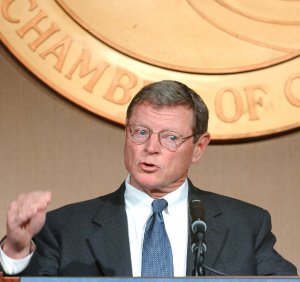
U.S. Senator James Inhofe, (R-Okla) said at the 2002 Christian Coalition Road to Victory gathering, "Get the few liberals out! You will be doing the Lord's work, and He will richly bless you for it." Senator Inhofe was richly blessed. Since 2000 he has received more than $500,000 in campaign contributions from oil, gas, electric and mining industries. more When Republicans won a majority in the U.S. Senate after the 2002 elections, Senator Inhofe became chair of the Committee on the Environment and Public Works. One of his first acts was to appoint a coal mining lobbyist to oversee clean air legislation. more While Europe was sweltering in record-breaking heat, Inhofe made an impassioned two-hour speech on global warming. On July 28, 2003, he said, "With all of the hysteria, all of the fear, all of the phony science, could it be that man-made global warming is the greatest hoax ever perpetrated on the American people?" Just 25 days earlier, a stunning report had been issued by the World Meteorological Organization, an "impeccably respected UN organization that is not given to hyperbole" (Independent,7/3/03). The British newspaper reported:
The report cited as an example the 562 tornadoes that hit parts of the United States in just one month -- May, 2003. The New York Times reported that Inhofe convened a hearing on global warming that included only that "small core of researchers who insist there's no evidence for human-centered warming of any sort." (8/4/03) The Times then quoted Dr. Rogers A. Philips, director of the Center for Science and Technology Research at the University of California, noting "We are on the brink of having Republican science and Democrat science." Fortune magazine, 1/26/04, reports on Global Warming as the Pentegon's nightmare. "The threat that has riveted their attention is this: Global warming, rather than causing gradual, centuries-spanning change, may be pushing the climate to a tipping point." more In late October Inhofe said:
Anti-ScienceClean Air Watch Assails EPA Soot Decision - Agency Ignores Its Own Science Advisers, Clean Air Watch, September 21, 2006 Onward Christian "Science", Talk To Action, June 7, 2006 Climate Expert Says NASA Tried to Silence Him, New York Times, January 29, 2006Ignoring Science on Clean Air, New York Times, January 17, 2006 Republicans Accused of Witch-Hunt against Climate Change Scientists, UK Guardian, August 30, 2005 Senator James Inhofe: "In February, 20 U.S. Nobel laureates denounced the Bush administration's political manipulations of science. But if Bush is bad, Inhofe is a kind of scientific Attila the Hun," writes Chris Mooney in Earth Last (The American Prospect, 05.07.04). "James Inhofe proves 'flat Earth' doesn't refer to Oklahoma." "If Inhofe is out of step with science, he's right in line with his conservative and pro-business constituency." President Bush: The Bush administration is proposing that the Office of Management and Budget (OMB) have final authority on
This enormous policy shift would also put the OMB in charge of how much information the public should be given regarding the "release of emergency declarations from the federal agencies responsible for public health, safety, and the environment." The following article, "George W. Bush's War on Nature" warns of the danger of trusting ideology over science. "Republicans are pushing the most radical assault on the environment in modern times. But history warns of catastrophe for leaders who trust ideology over science." more New EPA Mercury Rule Omits Conflicting Data, Washington Post, March 22, 2005 Put a Tiger In Your Think Tank, Mother Jones, May/June 2005 issue:
Kan. Debate Challenges Science Itself, Associated Press, May 15, 2005 Government Shirked Its Duty to Wild Fish, a Judge Rules, New York Times, May 27, 2005:
Bush Aide Softened Greenhouse Gas Links to Global Warming, New York Times, June 8, 2005:
U.S. Pressure Weakens G-8 Climate Plan, Washington Post, June 17, 2005 Political Appointees Pollute Waters at Ocean Agency, PEER, June 28, 2005 Science Ignored, Again, New York Times, October 14, 2006 States Rights and the EnvironmentFrom the Los Angeles Times: by staff writer, Elizabeth Shorgun:
"The States' Rights Principle" by Gene Karpinski, Executive Director of the U.S. Public Interest Research Group:
|
|||||||
| home | contact | about us | |||||||
